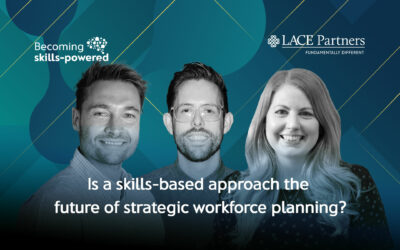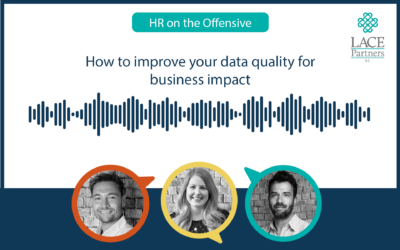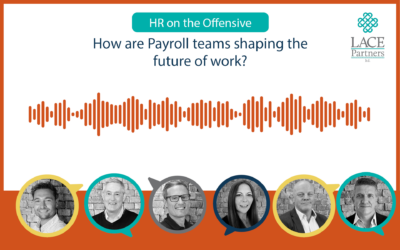Key takeaways:
- HR will have to develop a new approach to redesigning work, one that embraces AI.
- HR must be at the forefront of driving business transformation, not just HR function transformation.
- Any HR tech investment should clearly align with the broader business and people strategy, as it cannot function effectively in isolation.
- Organisations are increasingly valuing future-relevant skills over traditional experience.
- The role of people managers is also evolving to support employee learning and career development in this new environment.
Each year, the team at LACE Partners comes together to explore the ‘big ticket items’ likely to dominate the HR and Payroll professionals’ agenda. This year is no exception, so we’ve got some of the team together to give their thoughts on HR and Payroll trends in 2025.
The skills imperative: Preparing your workforce for the future
Key focus areas – not just for talent professionals, but businesses as a whole this year – in the talent space will inevitably be linked to three key parts:
The Human AI workforce:
AI becomes a reality emphasising the requirement for AI skills across all parts of the organisation. HR will have to develop an approach to re-designing work to embrace AI in all tasks and activities and realise the productivity gains from these micro-uses of AI. The implications of new work augmented roles, new approaches to management as well as measuring productivity.
Check out our podcast from last year on how AI will impact skills-powered organisations.
Accessing skills
Increasing importance of skills that are fit for the future versus experience – how can HR make sure they are not missing out parts of the workforce in this journey? For more info on the discussion about how you can use a skills strategy to boost business success, check out our blog here.
Role of the line manager
What is the new role of the people manager in a skills-focused world, where employees own their careers/learning? What do managers do in the context of increased AI or in a product environment? Reflecting on the importance of leadership in a skills-based organisational environment, we looked at how to tackle potential skills crises in an economic slump.
Payroll’s pivotal moment: Navigating the noise and building a strong foundation
In 2024 there was a lot of noise in the payroll market (check out this People Management article from March last year as an example), in particular around AI with an extensive marketing effort behind it and a promise to revolutionise how most of us work. Another key area is around cyber-security; with what seems to be weekly reports of data breaches and cyber-attacks, organisations are looking to add clarity and rigour around their security. We are seeing a lot of organisations also looking to standardise and align their functions and a lot of this is linked to the drive for payroll to play more of a role in the employee experience (EX) – which lends itself to better alignment with HR – and employee value proposition (EVP) through initiatives like earned wage access (EWA).
Getting the basics right
The truth is, behind all the noise is a reality we are seeing more and more, which is to get the foundations in order. Whether a result of trying to make changes unsuccessfully or simply recognising that they aren’t in a position to capitalise on developments and enhancements in the market, organisations are recognising that what is holding them back is failure to optimise their foundations. As the carrot on the stick becomes larger and multiplies, the recognition of the groundwork required even to begin the thought process is enhancing, and this trend will likely continue into 2025 and beyond.
Payroll is at a turning point, the commentary around ‘becoming strategic’ has had a lot of mileage, but what’s important is that organisations recognise the need to look at the role of payroll in their organisation and take a strategic view of how to get there – starting with the foundations.
HR: the future heroes of business transformation
Transformation isn’t going away in 2025 and the ‘People’ dimension of transformation is critical to success. As work and jobs change, so do the value that people bring to the business, as does any changes to the way organisations are structured changes. Businesses will need the support of specialists who understand intimately how the people dimension of change will have a fundamental impact of any future growth.
HR must ‘step out of the shadows’ again
The response from HR has been mixed; capacity has dictated the ability for HR teams to lead on business-wide change, the capability of HR teams to lead on business-wide change has also had an impact, as has the mindset of the HR function has played a part. In 2019, we wrote a whitepaper, HR on the Offensive, in which we stated that HR needed to “step out of the shadows”. Perhaps now it is time for HR to do the same and be at the forefront of driving business transformation, not just HR function transformation. Where HR has historically not been front and centre and seen it as high on the prioritisation list, 2025 and beyond needs to see that step change.
HR has often only participated at the end of a transformation, seen as mere ‘order taker’. Transformation is a huge opportunity for HR to play a much more strategic role in the business. How do the people in the business need to evolve alongside investments in customer relationships, products and services, channels, technology and supply chain? We see a huge uptick in interest from the market in skills-based organisations, strategic workforce planning (SWP), pivoting the HR operating model to be more responsive to business transformation. We also see an increased awareness of the need for better internal and external data, reporting and modelling and increased partnership with strategy, finance and IT to better support the transformation agenda.
Get beyond the hype, reduce the stress and realise the value of HR technology
Whether you have started your journey to the cloud, are on the way or have seemingly got to the top of the climb (we’ll be touching on how to optimise your platform in 2025) there are always going to be similar challenging themes:
- What is the purpose of ANY new technology need? How is it supporting a broader business strategy and people strategy? E.g. supporting the war for talent and new skills, or being in a position to capitalise on new trends and technology.
- What is the value case that truly defines the value that any investment will deliver? Is the value needed, for example, reduced risk, cost efficiency, employee experience, etc.?
- What is the right approach to defining the case for change you need to embed and how do you change the culture and behaviours and measure adoption to ‘make change stick’?
- What are the broader operating model considerations? Replacing technology requires careful consideration of the broader consequences for the operating model. E.g. the cloud support model, the consistency of roles, the role of reporting and analytics and new skills and capabilities needed to leverage.
- What are the opportunities for quick wins on the way? Moving to the cloud is a multi-year journey, so it makes sense to consider incremental change on the way to build the transformation and decision-making muscles/ E.g. RPA in problematic areas.
Overall, exciting niche vendors are coming through, AI and automation opportunities abound. To deliver value to an organisation, teams must act deliberately, aligning every effort with a broader business and people strategy in a methodical, planned way. Foundations first, in order to accelerate change through tech.
Interested in talking to us about any of the above HR and Payroll trends in 2025? Fill in the form below and we’d be happy to chat. Or connect with any of today’s contributors direct via LinkedIn on their team member page.










